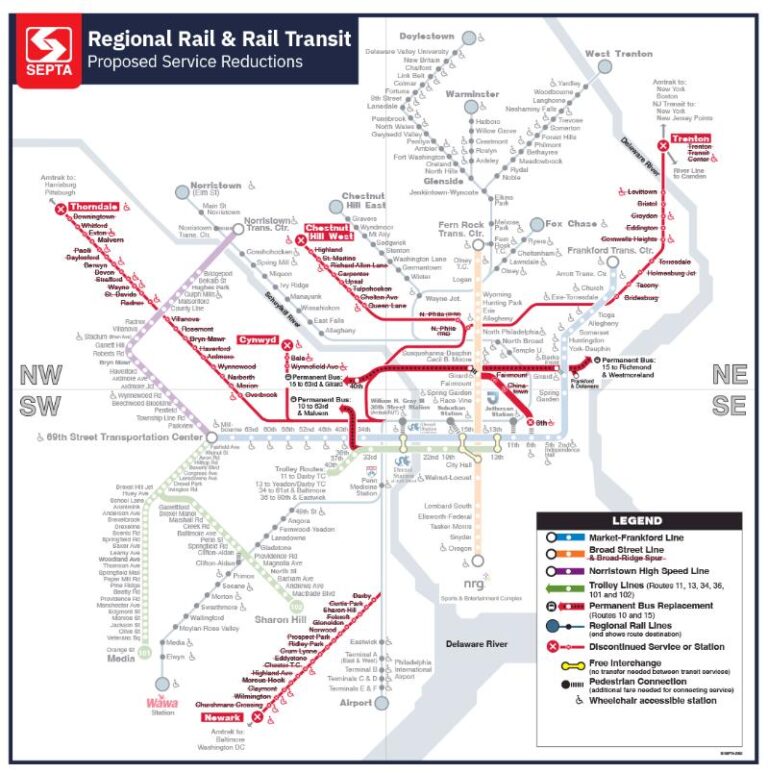Philadelphia Businesses Navigate Challenges Amid SEPTA’s Latest Transit Service Reductions
Operational Strains on Philadelphia Enterprises Due to SEPTA Service Cutbacks
As SEPTA rolls out its newest round of service reductions this month, Philadelphia’s business community is already encountering significant operational hurdles. Employees and commuters alike are facing increased difficulties in maintaining punctuality, which raises concerns about overall workplace efficiency and customer engagement. Retailers, particularly those dependent on visitors from across the city, anticipate a downturn in sales as transit accessibility diminishes. In response, many business owners are adopting flexible work schedules and expanding remote work opportunities to counterbalance these disruptions.
Primary challenges impacting operations include:
- Reduced employee attendance and timeliness
- Decline in customer visits during peak business hours
- Delays in supply chain logistics
- Increased expenses due to reliance on alternative transportation
| Industry | Anticipated Effect | Common Adaptation |
|---|---|---|
| Retail | Weekday revenue decline | Longer weekend operating hours |
| Hospitality | Reduced walk-in clientele | Targeted promotions for neighborhood residents |
| Corporate Offices | Increased employee tardiness | Flexible hours and telecommuting |
Economic Ripple Effects: How Transit Cuts Are Reshaping Commute Patterns
The recent SEPTA service reductions are causing widespread shifts in commuting habits across Philadelphia, with thousands of workers experiencing longer wait times and fewer transit options during rush hours. This disruption is prompting many employees to adjust their work hours or seek alternative transportation, such as ride-sharing or personal vehicles. Central business districts have reported noticeable drops in foot traffic during traditional commuting periods, raising concerns about potential revenue declines in the near term. Employers are increasingly adopting flexible scheduling and remote work policies to maintain productivity amid these challenges.
Transportation experts caution that these changes may have broader economic consequences. The increased use of ride-share services and private cars could exacerbate traffic congestion and parking shortages citywide. The table below highlights projected shifts in commuting modes based on recent surveys:
| Commute Method | Pre-Cuts Usage | Projected Post-Cuts Usage |
|---|---|---|
| SEPTA Transit | 65% | 40% |
| Ride-Share Services | 10% | 25% |
| Personal Vehicles | 20% | 30% |
| Remote Work | 5% | 15% |
Community advocates are calling for renewed investment in public transit infrastructure to prevent long-term economic setbacks. Meanwhile, businesses must prepare for ongoing fluctuations in employee availability and commuting behaviors.
Adaptive Strategies for Philadelphia Businesses Facing Transit Limitations
In response to SEPTA’s service reductions, Philadelphia companies are implementing a variety of innovative tactics to maintain operational continuity. Many are expanding telecommuting options and adopting flexible work hours to accommodate employees’ altered travel schedules. Collaborations with ride-share providers have also become more common, offering reliable alternatives to public transit and helping reduce absenteeism.
Beyond commuting solutions, businesses are restructuring workflows to minimize disruption. This includes staggered shifts and establishing satellite offices closer to residential neighborhoods, reducing travel time and costs. Key strategies gaining traction include:
- Subsidized bike-share memberships
- Internal carpool coordination platforms
- Investment in virtual meeting technologies
| Strategy | Advantage | Anticipated Outcome |
|---|---|---|
| Flexible Scheduling | Eases peak-hour congestion | Boosts employee satisfaction and efficiency |
| Ride-Share Partnerships | Dependable transit alternatives | Reduces absenteeism |
| Satellite Offices | Closer proximity to employees’ homes | Cuts travel time and expenses |
Collaborative Efforts Urged by Community Leaders to Support Businesses and Commuters
In light of SEPTA’s service reductions, local officials and business groups are intensifying efforts to develop cooperative solutions that sustain Philadelphia’s economic vitality. Emphasizing the importance of multi-sector collaboration, community leaders advocate for initiatives such as expanded shuttle services, flexible work hour programs, and improved communication channels to keep affected parties informed and engaged.
The table below summarizes key concerns raised during recent community discussions alongside proposed interventions and responsible stakeholders:
| Issue | Suggested Remedy | Accountable Entities |
|---|---|---|
| Limited commuter access | Launch additional shuttle routes | SEPTA, City Government |
| Drop in customer foot traffic | Initiate “shop local” awareness campaigns | Business Associations |
| Revenue shortfalls | Provide grants and subsidies for small businesses | Economic Development Agencies |
These collaborative measures reflect a shared commitment to resilience, aiming not only to soften immediate impacts but also to foster a sustainable transit and economic environment for Philadelphia’s future.
Final Thoughts
As SEPTA enacts its planned service reductions, Philadelphia’s business sector is preparing for the cascading effects on customer flow and employee commuting. Stakeholders citywide remain vigilant, adopting adaptive strategies to navigate the evolving transit landscape. This situation highlights the vital connection between public transportation and local economic health, underscoring the need for ongoing cooperation among transit authorities, business leaders, and community members. 6abc Philadelphia will continue to provide updates on how these transit changes influence the region’s businesses and residents.


